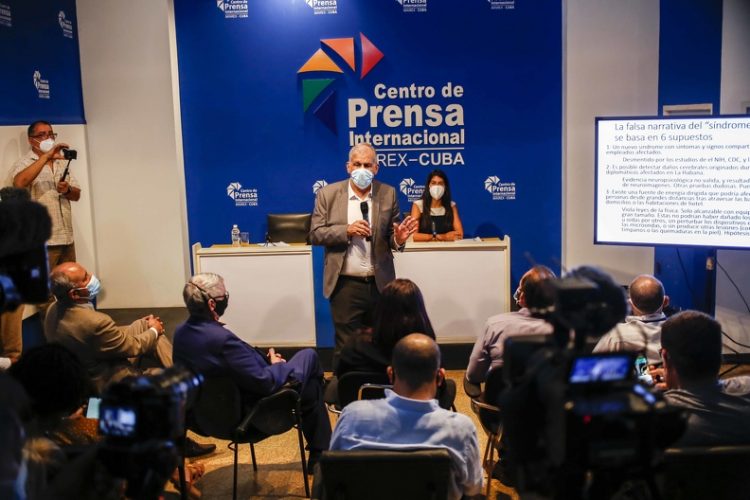Cuban scientists refuted the existence of the so-called “Havana Syndrome” and the narrative that supports it, according to which the health incidents suffered by U.S. diplomats in the Cuban capital, and more recently in other world capitals, are due to a single ailment resulting from attacks against them.
A technical report prepared by a group of experts from the Cuban Academy of Sciences (ACC) concluded that “the evidence used to support the ‘mystery syndrome’ narrative is not scientifically acceptable in any of its components” and that said narrative “has survived thanks to a biased use of science, in which dissenting points of view have been suppressed.”
Dr. Mitchell Valdés-Sosa, director general of the Cuban Center for Neurosciences (CNEURO) and head of the committee of experts, said that the evaluation presented this Monday constitutes the first document in which Cuban researchers examine all aspects of the problem based on all the published information, on close consultation with foreign scientists and on the police report of the Cuban Ministry of the Interior.
According to the researchers, the evidence points to the possibility that some U.S. employees located in Havana felt ill due to a heterogeneous collection of medical conditions, some pre-existing before coming to Cuba and others acquired due to simple or well-known causes.
Acuerdan compensación financiera para víctimas del supuesto “Síndrome de La Habana”
Many diseases that affect the general population, they said, can explain most of the symptoms, therefore there is no novel syndrome, and only a minority of people have presented a detectable brain dysfunction, most from experiences prior to their stay in Havana; others for well-known medical conditions, they said.
They added that no known form of energy can selectively cause brain damage (with spatial precision similar to a laser beam) under the conditions described in those events. And although there are weapons that use sound or large microwaves, there is no possibility of them going unnoticed.
Neither the Cuban police, nor the FBI, nor the Royal Canadian Mounted Police have discovered evidence of attacks on diplomats in Havana, despite intensive investigations, they stressed.
They noted that psychogenic and toxic explanations for many symptoms in some cases were rejected for proper investigation, despite the fact that all conditions for the psychogenic spread of the discomfort were present, including a likely inadequate initial medical response, early U.S. government backing for that theory and sensationalist media coverage.
Dr. Valdés-Sosa, speaking on behalf of the group of experts, reaffirmed the ACC’s willingness to review these conclusions if new evidence emerges and requested that they be refuted in a climate of open scientific collaboration.












Dear Eric,
I’m a researcher and noticed Havana Syndrome shares the same odd symptoms with an airborne infection like Disseminated Histoplasmosis. A hallmark of the infection is tinnitus (mine sounds like cicadas…I was in an outbreak)…also vertigo (including benign paroxysmal positional vertigo), the sensation of full/blocked ear, a feeling of “fluttering” eardrum/being stabbed inside the ear, nosebleeds, headaches/migraines, photophobia, vision problems, nausea, what seemed like “explosions” inside my head (presumably since fungal hyphae carry an electrical charge?), “whooshing” sounds (from the effects on the ears, nerves, CNS, etc.) strange sensations, seizures, skin problems like weird rashes, sleep disturbances including insomnia, fatigue, inflammatory bowel disease, mood issues, delusions and hallucinations, autoimmune symptoms (presumably since fungus evolved with mammals and share similar molecules), cancer (particularly hematological malignancies), etc. …basically any type of issue in any organ. (Fungus is known to convert molecules, for example turning tryptophan into tryptophol, which causes “sleeping sickness.”) It can infect the central nervous system, and it also converts/creates various chemicals, including possibly endogenous DMT (fungus can methylate organic molecules=dimetyltryptamine?).
There have been numerous outbreaks, and misinformation about this infection, like the fact immunocompetent people CAN get Disseminated Histoplasmosis when exposed to a large inoculum (like near bats or chicken farms, although it’s “everywhere” in the air). Bats evolved to deal with the photophobia and tinnitus it causes by hunting at night using echolocation. They carry it and shed it in their feces. The odds are 99.9999999% that a doctor will NOT be able to diagnose DISSEMINATED Histoplasmosis in immunocompetent victims, and many lab tests have high false-negative results.
This might explain people who subsequently developed a form of Parkinson’s disease. (It gave me temporary tremors and symptoms of fibromyalgia).
I believe this explanation is more plausible than purposeful “attacks” against people who (pardon my saying) are not very “important” in the whole scheme of things. Remember that one ambassador years ago who suffered from arsenic poisoning that turned out to be flakes of paint falling into her food instead of a purposeful attack?
Also, I and others are convinced it IS sarcoidosis, and it appears to be a cause of (and I experienced while most ill with the infection) multiple sclerosis and/or ALS, etc. It also raises the risk of stroke, causes hydrocephalus, etc., etc., etc. Heart disease, liver/kidney disease, lung disease, central nervous system disease….
Additionally, doesn’t this infection share all the same symptoms with Gulf War Syndrome?
And one more thing…there are different strains of the pathogen, so a new person might experience more violent symptoms than someone who has been in the area for a while. And it would tend to affect people in the same building/area.
Thank you for your time